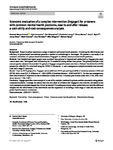Economic evaluation of a complex intervention (Engager) for prisoners with common mental health problems, near to and after release: a cost-utility and cost-consequences analysis
| dc.contributor.author | Hunter, RM | |
| dc.contributor.author | Anderson, R | |
| dc.contributor.author | Kirkpatrick, T | |
| dc.contributor.author | Lennox, C | |
| dc.contributor.author | Warren, F | |
| dc.contributor.author | Taylor, RS | |
| dc.contributor.author | Shaw, J | |
| dc.contributor.author | Haddad, M | |
| dc.contributor.author | Stirzaker, A | |
| dc.contributor.author | Maguire, M | |
| dc.contributor.author | Byng, Richard | |
| dc.date.accessioned | 2021-09-20T12:56:43Z | |
| dc.date.issued | 2021-08-05 | |
| dc.identifier.issn | 1439-3972 | |
| dc.identifier.issn | 1618-7601 | |
| dc.identifier.uri | http://hdl.handle.net/10026.1/17871 | |
| dc.description.abstract |
<jats:title>Abstract</jats:title><jats:sec> <jats:title>Background</jats:title> <jats:p>People in prison experience a range of physical and mental health problems. Evaluating the effectiveness and efficiency of prison-based interventions presents a number of methodological challenges. We present a case study of an economic evaluation of a prison-based intervention (“Engager”) to address common mental health problems.</jats:p> </jats:sec><jats:sec> <jats:title>Methods</jats:title> <jats:p>Two hundred and eighty people were recruited from prisons in England and randomised to Engager plus usual care or usual care. Participants were followed up for 12 months following release from prison. The primary analysis is the cost per quality-adjusted life year (QALY) gained of Engager compared to usual care from a National Health Service (NHS) perspective with QALYs calculated using the CORE 6 Dimension. A cost-consequences analysis evaluated cross-sectoral costs and a range of outcomes.</jats:p> </jats:sec><jats:sec> <jats:title>Results</jats:title> <jats:p>From an NHS perspective, Engager cost an additional £2737 per participant (95% of iterations between £1029 and £4718) with a mean QALY difference of − 0.014 (95% of iterations between − 0.045 and 0.017). For the cost-consequences, there was evidence of improved access to substance misuse services 12 months post-release (odds ratio 2.244, 95% confidence Interval 1.304–3.861).</jats:p> </jats:sec><jats:sec> <jats:title>Conclusion</jats:title> <jats:p>Engager provides a rare example of a cost-utility analysis conducted in prisons and the community using patient-completed measures. Although the results from this trial show no evidence that Engager is cost-effective, the results of the cost-consequences analysis suggest that follow-up beyond 12 months post-release using routine data may provide additional insights into the effectiveness of the intervention and the importance of including a wide range of costs and outcomes in prison-based economic evaluations.</jats:p> </jats:sec><jats:sec> <jats:title>Trial registration</jats:title> <jats:p>(ISRCTN11707331).</jats:p> </jats:sec> | |
| dc.format.extent | 193-210 | |
| dc.format.medium | Print-Electronic | |
| dc.language | en | |
| dc.language.iso | en | |
| dc.publisher | Springer Verlag | |
| dc.subject | Cost-utility | |
| dc.subject | Cost-consequences | |
| dc.subject | Prison | |
| dc.subject | Common mental health problems | |
| dc.subject | Mentalisation therapy | |
| dc.title | Economic evaluation of a complex intervention (Engager) for prisoners with common mental health problems, near to and after release: a cost-utility and cost-consequences analysis | |
| dc.type | journal-article | |
| dc.type | Journal Article | |
| dc.type | Randomized Controlled Trial | |
| plymouth.author-url | https://www.webofscience.com/api/gateway?GWVersion=2&SrcApp=PARTNER_APP&SrcAuth=LinksAMR&KeyUT=WOS:000681605700001&DestLinkType=FullRecord&DestApp=ALL_WOS&UsrCustomerID=11bb513d99f797142bcfeffcc58ea008 | |
| plymouth.issue | 2 | |
| plymouth.volume | 23 | |
| plymouth.publication-status | Published | |
| plymouth.journal | European Journal of Health Economics | |
| dc.identifier.doi | 10.1007/s10198-021-01360-7 | |
| plymouth.organisational-group | /Plymouth | |
| plymouth.organisational-group | /Plymouth/Faculty of Health | |
| plymouth.organisational-group | /Plymouth/Faculty of Health/Peninsula Medical School | |
| plymouth.organisational-group | /Plymouth/REF 2021 Researchers by UoA | |
| plymouth.organisational-group | /Plymouth/REF 2021 Researchers by UoA/UoA03 Allied Health Professions, Dentistry, Nursing and Pharmacy | |
| plymouth.organisational-group | /Plymouth/Research Groups | |
| plymouth.organisational-group | /Plymouth/Research Groups/FoH - Community and Primary Care | |
| plymouth.organisational-group | /Plymouth/Research Groups/Institute of Health and Community | |
| plymouth.organisational-group | /Plymouth/Research Groups/Institute of Translational and Stratified Medicine (ITSMED) | |
| plymouth.organisational-group | /Plymouth/Research Groups/Institute of Translational and Stratified Medicine (ITSMED)/CCT&PS | |
| plymouth.organisational-group | /Plymouth/Research Groups/Plymouth Institute of Health and Care Research (PIHR) | |
| plymouth.organisational-group | /Plymouth/Users by role | |
| plymouth.organisational-group | /Plymouth/Users by role/Academics | |
| dc.publisher.place | Germany | |
| dcterms.dateAccepted | 2021-07-29 | |
| dc.rights.embargodate | 2021-9-21 | |
| dc.identifier.eissn | 1618-7601 | |
| dc.rights.embargoperiod | Not known | |
| rioxxterms.funder | National Institute for Health Research | |
| rioxxterms.identifier.project | Developing and evaluating a collaborative care intervention for prisoners, with common mental health problems, near to and after release (Engager 2) | |
| rioxxterms.versionofrecord | 10.1007/s10198-021-01360-7 | |
| rioxxterms.licenseref.uri | http://www.rioxx.net/licenses/all-rights-reserved | |
| rioxxterms.licenseref.startdate | 2021-08-05 | |
| rioxxterms.type | Journal Article/Review | |
| plymouth.funder | Developing and evaluating a collaborative care intervention for prisoners, with common mental health problems, near to and after release (Engager 2)::National Institute for Health Research |


